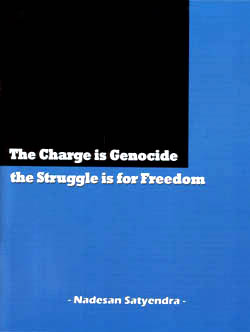 The
Charge is Genocide - the Struggle is for Freedom traces the
facts relating to the
genocidal onslaught on the people of Tamil Eelam by
successive Sinhala Sri Lanka governments during the past fifty
years, and raises the question: Why did these genocidal attacks
happen and why do they continue to happen?
The
Charge is Genocide - the Struggle is for Freedom traces the
facts relating to the
genocidal onslaught on the people of Tamil Eelam by
successive Sinhala Sri Lanka governments during the past fifty
years, and raises the question: Why did these genocidal attacks
happen and why do they continue to happen?
The author argues that ethnic cleansing is about assimilating
a people and that the preferred route of a conqueror is to
achieve his objective without resort to violence - peacefully
and stealthily. But
when that is resisted, albeit peacefully, the would be
conqueror turns to murderous violence and genocide to progress
his assimilative agenda. He concludes that in the island of Sri
Lanka, the
record shows that during the past fifty years and more, the
intent and goal of all Sinhala governments (without exception)
has been to secure the island as a Sinhala Buddhist Deepa.
Sinhala Buddhist 'ethno nationalism' masquerading as a 'civic'
Sri Lankan nation is the genocidal side of democracy.
The central theme of the book is that the conflict in the
island of Sri Lanka is not simply about the systematic
violations of human rights of the Tamil people, or about
violations of the humanitarian law of armed conflict or the
violations of the ceasefire agreement - or for that matter
genocide. The conflict in the island is about the refusal of
the people of Tamil Eelam to submit to alien Sinhala rule.
The author contends that in the ultimate analysis, the
struggle of the people of Tamil Eelam for freedom is about
democracy and that if democracy means the rule of the people, by
the people, for the people then it must follow, as night follows
day, that no one people may rule another.
The author emphasises the need for the international
community (the trilaterals - USA, European Union and Japan -
together with India and China) to engage with the people of
Tamil Eelam, in an honest and open dialogue as to the
strategic interests that each of the IC members themselves seek
to secure in the island of Sri Lanka - and, indeed, whether
each seek to prevent a resolution of the conflict except
on terms which secure each of their own (conflicting) strategic
interests in the uneasy balance of power which prevails in the
Indian Ocean region today. He calls upon the international
community to seek liberation from the political rhetoric of
terrorism and to support the liberation of peoples.